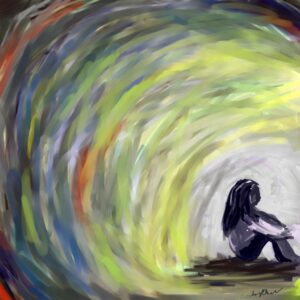Have you ever found yourself turning around at the next intersection to check that the iron was genuinely switched off? Have you found yourself rearranging your office desk simply because it “bothered you”? Obsessive Compulsive Disorder can excessively disrupt your life and no matter how hard you try to shake the impulsive urges, you find yourself falling back into a pattern of wiping down every counter and stopping to rearrange the flowers in your vase.
OCD is typically described as a form of anxiety which is commonly characterized by unwanted thoughts which seem uncontrollable, repetitive behaviors which seem to become ritualized. If you are an OCD sufferer, you may agree that your intentions are irrational at times. Quite often, OCD creates a mode we get stuck in, like a record on repeat, we find the need to check things over and over again and some even experience other side effects like the urge to scrub your hands until they are raw.
 Obsessions – In order for one to understand the root of these obsessions, one needs to realize that they are impulses which reoccur in your mind. The repetitive actions are our way of “attempting” to make the urges go away. very much like a heroine user needing his next fix to silence the voices.
Obsessions – In order for one to understand the root of these obsessions, one needs to realize that they are impulses which reoccur in your mind. The repetitive actions are our way of “attempting” to make the urges go away. very much like a heroine user needing his next fix to silence the voices.
Compulsions – The action which makes the obsession go away. The fear of contamination would be a great example of how we deal with our obsessions. I have scrubbed my bathroom from head to toe, only for two little kids to come home from school and trash it.
To others, this may seem normal, but to an OCD sufferer, this is an immense struggle of willpower. This causes huge anxiety, effectively demanding all of my time when I really should just walk away and meditate.
This sadly is the face of OCD.
There are a few categories considered to be related to OCD behavior:
- The Washer – The fear of contamination makes them compulsive cleaners.
- The Checker – Did I lock the door? Did I turn off the stove? They possess an immense general fear of harm or danger.
- Those who Doubt and Sin – They possess an immense fear of the implications of not doing something correctly.
- Counters and Arrangers – Symmetry comes to mind. Things need to be even and aligned. Even the colors of things may annoy then if not just right.
- Hoarders – They possess an immense fear of letting go of things which to them meant the world. Sentimental by nature, they refuse to throw things away quite often quoting that they may need them at a later stage.
There are a few harmful thoughts OCD sufferers may possess which are spiritually damaging, slowly peeling away the good person who just needs help finding their comfort zone.

I suffer immensely with the fear of dirt. Through the years, speaking to other like-minded individuals, there are some seriously worrying images people possess of themselves. The fear of losing control and harming others or even themselves, sexually intrusive thoughts and violence are all things that need to be addressed.
The milder, yet equally offensive ones are when morals and religion are focused on excessively, fearing losing things and having to search for them (I find myself checking that my car keys are ALWAYS hung up), walking past a display, wanting to rearrange it as it’s not quite right and superstitions are all things which need to be addressed – we fight this battle every day.
Common compulsive behaviors in obsessive-compulsive disorder (OCD) include:
Excessively checking things, calling on loved ones often to ensure they’re safe, reducing their own anxiety by tapping, counting, clicking a pen or doing seemingly senseless things. Spending wasteful time excessively washing or cleaning, praying excessively which is usually triggered by the fear of sin and collecting junk and food containers.
There is a strong link between hoarding and OCD
it never occurred to me how I collect useless things. Jars, news papers for “in case the dog wees on the floor’, mugs (I have about 25) and plastic bags (I refuse to let them end up on a dump site, so I excessively reuse them). Quite often, these symptoms go hand in hand with other disorders like depression, PTSD, compulsive buying, kleptomania, ADHD, skin picking and tic disorders.
Many of the symptoms in children may not initially be obvious, but there are a few things one should look out for:
Usually occurring in adolescence or young adulthood, some younger children may display signs too. However, many of their symptoms may display as OCD, but could be related to other conditions like ADD, Autism and Tourette’s syndrome. The only way to ascertain the route cause is through a medical examination by a practitioner who will look at the symptoms holistically.
Coping techniques

One could really benefit from self care in the instance where a sufferer struggles to cope. Meditation allows us to focus our energy wisely as well as finding hobbies and interests which may help you cope. I find that on particularly bad days, meditation followed by a nice hack out on my horse helps tremendously.
- Regular exercise allows one to focus energy into something meaningful and strengthens the immune system.
- Staying connected with your loved ones may also be beneficial. Many OCD sufferers end up being labeled as introverts simply because they let their obsessions consume them. Speak to your family about your concerns – they may be your strength when you need it most.
- Work on your sleep patterns. Many of us are running low on sleep, which in turn affects everything we do. When we are well rested, we tend to be more emotionally content, which in turn aids in the ability to cope with our OCD tendencies.
- Stress is well known to trigger our inner issues. Be mindful in everything you do, try taking up yoga classes, practice deep breathing and you will start to notice your tension levels will decrease.
Know how to recognize the trauma which triggers OCD and resist the rituals that follow
Post traumatic experiences have a deep rooted role in OCD. Sometimes, nothing really helps until you have learnt how to deal with your past.
There are many powerful strategies which aid in eliminating OCD behavior. take on your fears – this may at first seem pretty difficult to master, but with time, you’ll find it to be second nature. The trick with OCD is to set time limits. A great example would be to say to yourself “I am only spending an hour today on doing laundry”, which allows you the ability to control your limits.
Re-focusing your attention may help as a short term distraction. Spend at least 15 minutes on something you enjoy. Go for a brisk walk, read a chapter out of your favorite book, call a friend. Quite often, you feel less of an urge to scrub down the entire kitchen once you’ve vented energy on doing something you really like.
Know how to anticipate the urges by finding the triggers which invoke them. If you are a compulsive checker, spend more attention to detail when locking the door the first time, this reassures you that you’ve actually done it.
Challenge your obsessive thoughts
Being stuck on a thought is really draining. When something arises that you feel may be an obsessive thought or worry, write it down. Note all your thoughts and compulsions as you go. Let’s call it your “thoughts Diary”. You will be amazed at how a diary can self-council your emotions. You may quickly realize how repetitive you are being and by doing so, those thoughts lose their power over you.
Another great coping mechanism is to reschedule. This may sound quite odd at first, but once you develop the habit, things may become a lot less taxing. Set a worry period every day. If you for example feel the need to rearrange your books, set a time and keep busy until that time arises. Then go on with rearranging your books (If you still even feel the urge to do so).
At the end of the day, soothe yourself to bed by having a nice herbal bath, some tea may help and calmly go to bed. Leave your cellphone out of reach and reflect on the greatness which was your day. Think about loved ones, your achievements and how you’re generally doing great, because that’s exactly what you are.
Thank you to Help Guide for the motivation behind this piece

